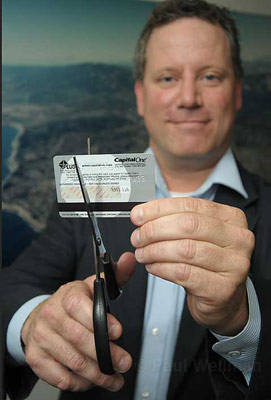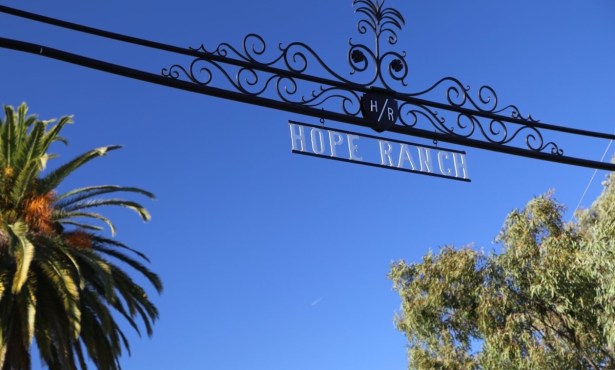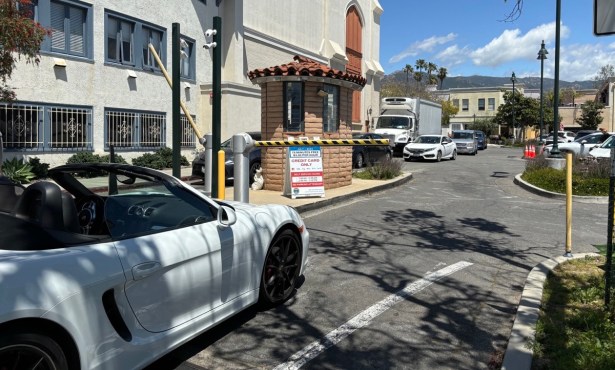Cities Put State on Notice
'Don't Raid Our Cookie Jars'

As a seven-year lobbyist for the League of California Cities, Dave Mullinax knows dysfunctional when he sees it. “As bad as we always said it was, this year it’s even worse,” Mullinax said with his customary grim humor. The “it” to which Mullinax refers is the sorry state of the California state budget, now a month behind its constitutionally mandated deadline and about $15 billion away from being balanced. With quick fixes and gimmicks exhausted long ago, Mullinax warned, the governor and the State Legislature have turned their eyes upon the $3 billion in property taxes that the state collects and distributes to the 58 counties and 480 cities throughout California. Should their hands lay hold of that cash, the City of Santa Barbara, for example, could be out $3.2 million this year and the County of Santa Barbara short-changed by $10 million. After the $4 million in cuts and adjustments City Hall took pains to administer over a two-year period, Mayor Marty Blum said $3.2 million could prove a painful bite.
To protect against such raids, Mullinax and the League of Cities put initiative 1A on the ballot in 2004, and 84 percent of the voters overwhelming endorsed it. Now, it turns out, 1A may offer only illusions of protection. According to the measure, in emergency situations, the state is allowed to borrow up to eight percent of all non-school property taxes that would otherwise accrue to local governments on the strict condition that the money be paid back-with interest-within three years. The problem, at least according to Santa Barbara Councilmember Iya Falcone, who serves on the League of Cities board, is that the payback provision in Measure 1A might be unenforceable. She reported that a recent court ruling indicates that the courts may lack authority to order the Legislature to refund the money.
While the local impact of the state’s budget pain is still too speculative to accurately quantify, it appears that $886,000 in gas tax funds that would otherwise have gone to City Hall might be endangered. Additionally, it appears that millions of state dollars already appropriated to fund rehabilitation of two dilapidated downtown bridges-one at State Street and Cabrillo Boulevard and another at Haley and De la Vina streets-might be diverted to help repair San Francisco’s Golden Gate Bridge.
Mullinax and the League of Cities have responded by whipping city councils into a credit card-cutting frenzy as part of an orchestrated effort to chase state legislators away. “We need to cut the [state’s] credit cards up,” he told the Santa Barbara City Council Tuesday. “They’ve been borrowing billions from us since 1991. They need to stop balancing the state budget on our backs.” Mullinax said when he’s in Sacramento meeting with legislators, he always hears the same thing. “They want to know what else to cut or where to get the money,” he said. “That’s not my job. That’s their job, and they need to start doing it. But they don’t like hearing that.”
The problem may be worse than usual this year, but it’s hardly new. To pass a budget, the Legislature needs a two-thirds majority. Republicans have pledged no new taxes, while the Democrats have resisted the draconian cuts a balanced budget requires. Even Schwarzenegger, who has opposed a tax increase in years past, expressed a new willingness to consider one. For that to occur, however, every Democrat in the State Senate plus two Republicans would have to go along. In the Assembly, it would require every Democrat and seven Republicans.
Meanwhile, the Legislature has no more tricks to play. Interest, Mullinax said, will drive the $15 billion in bonds the governor issued when first elected to keep the state afloat up to $30 billion. The governor’s plan to raise $15 billion by leveraging the next 30 years’ lottery earnings is dead in the water. Likewise, the governor’s threat to pay state employees only minimum wage until a budget deal is reached fell flat when State Controller John Chiang refused the idea. Earlier this week, however, Schwarzenegger-whose approval ratings have plummeted to 40 percent-renewed that threat.
The problems are not easy to solve, Mullinax said, but the situation will deteriorate unless the Legislature gets serious. Since Schwarzenegger was elected, state spending has increased from $77 billion a year to $107 billion a year. The only good news Mullinax can see is that elected state officials have no room to run. “It could be that things have gotten so bad they have to address the issue in an honest way,” he added with a laugh.



